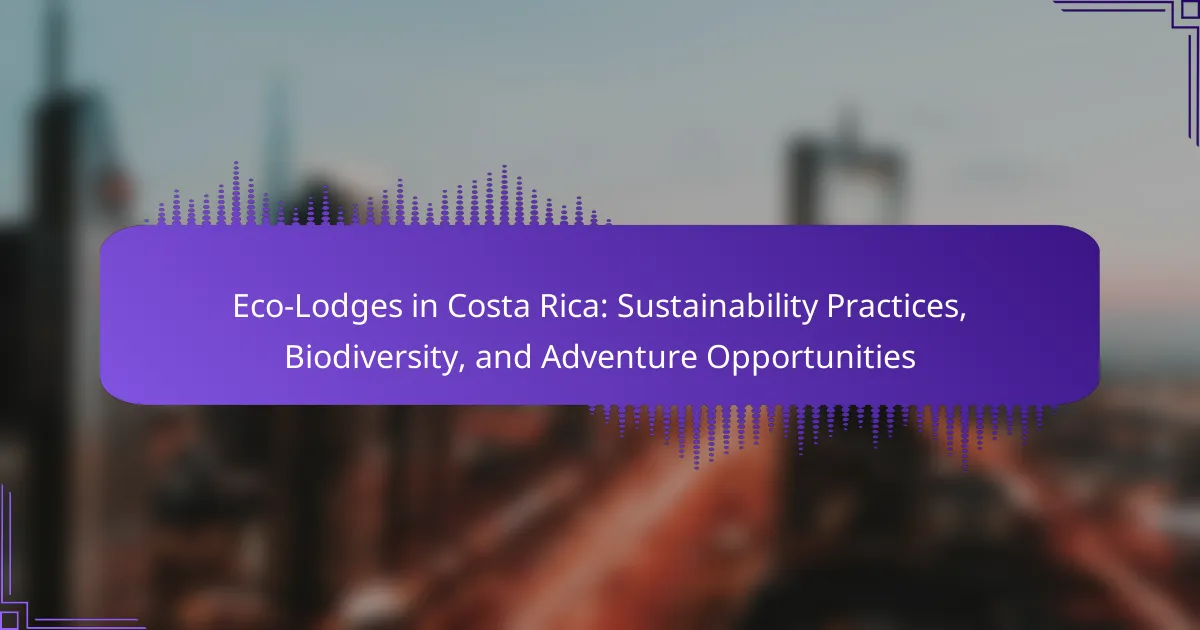Discover how eco-lodges in Costa Rica enhance sustainability practices, promote biodiversity, and offer thrilling adventure opportunities. These lodges implement eco-friendly construction and waste management while engaging in local conservation efforts. Guests can explore diverse activities like hiking and wildlife watching, all while supporting sustainable tourism. Learn how to choose the right eco-lodge that aligns with your values and enhances your travel experience.
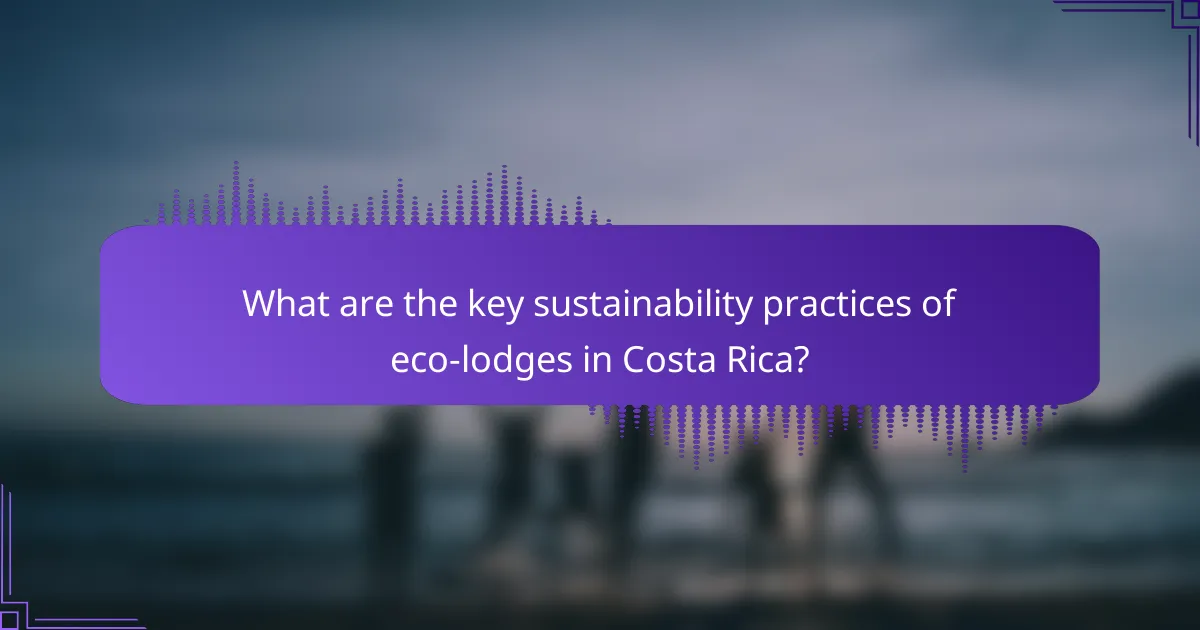
What are the key sustainability practices of eco-lodges in Costa Rica?
Eco-lodges in Costa Rica implement key sustainability practices that include eco-friendly construction, waste management, and conservation efforts. These lodges utilize renewable energy sources, such as solar power, to minimize their carbon footprint. They often engage in local reforestation projects, enhancing biodiversity while providing habitats for native species. Water conservation techniques are also prioritized, with systems in place to recycle water and reduce usage. Additionally, many eco-lodges support local communities by sourcing food and services locally, promoting sustainable tourism and economic growth.
How do eco-lodges minimize their environmental impact?
Eco-lodges minimize their environmental impact through sustainable practices that prioritize conservation. They utilize renewable energy sources, such as solar and wind power, to reduce carbon footprints. Water conservation systems, like rainwater harvesting, further minimize resource usage. Eco-lodges often employ local materials for construction, promoting biodiversity by preserving native ecosystems. Additionally, they offer educational programs to raise awareness about environmental issues, fostering a culture of sustainability among guests.
What renewable energy sources are commonly used?
Commonly used renewable energy sources include solar, wind, hydroelectric, geothermal, and biomass. These sources support eco-lodges in Costa Rica, enhancing sustainability practices.
Solar energy harnesses sunlight through panels, providing a clean power source. Wind energy utilizes turbines to convert wind into electricity, ideal for remote locations. Hydroelectric power generates energy from flowing water, often used in eco-lodge designs. Geothermal energy taps into the Earth’s heat, offering a consistent energy supply. Biomass energy converts organic materials into fuel, promoting waste reduction and sustainability.
How do eco-lodges engage with local communities?
Eco-lodges engage with local communities by promoting sustainable tourism practices that benefit both the environment and local economies. They often collaborate with local artisans, offering workshops and selling handmade goods, which helps preserve cultural heritage. Additionally, eco-lodges frequently employ local residents, providing jobs that support families and communities. They may also invest in community projects, such as schools or health services, enhancing overall quality of life. By fostering a connection between guests and the local culture, eco-lodges create a more immersive and responsible travel experience.
What waste management strategies are implemented?
Eco-lodges in Costa Rica implement various waste management strategies to promote sustainability. These include recycling programs, composting organic waste, and minimizing single-use plastics. Eco-lodges often educate guests on responsible waste disposal practices. As a result, they contribute significantly to environmental conservation and biodiversity preservation.
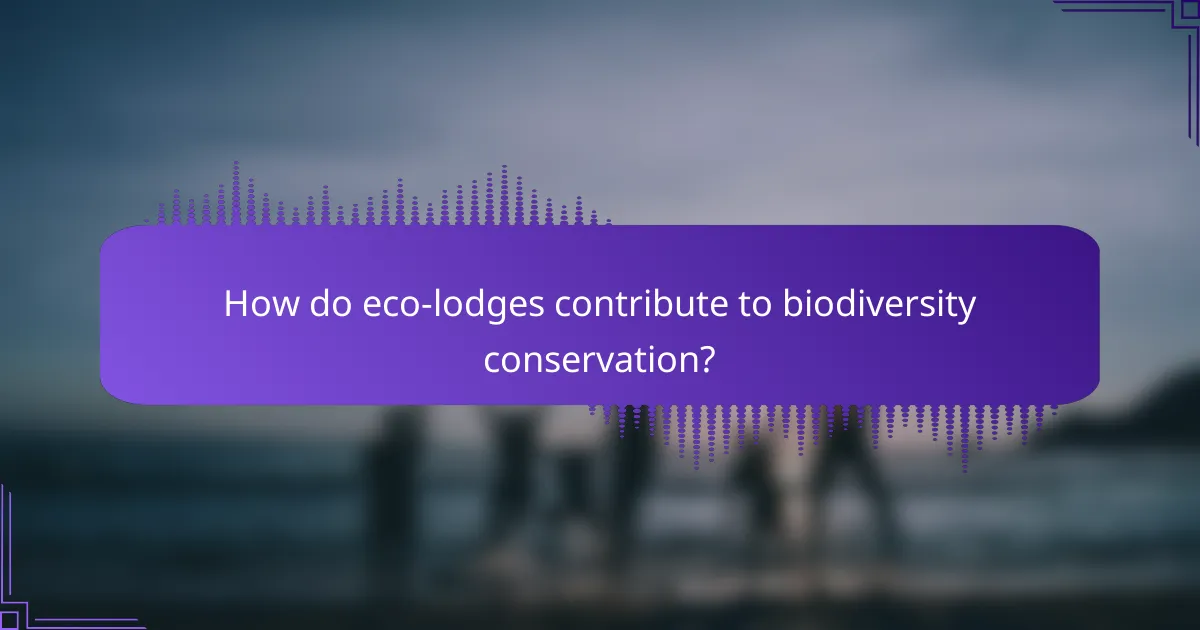
How do eco-lodges contribute to biodiversity conservation?
Eco-lodges contribute to biodiversity conservation by promoting sustainable tourism practices that protect ecosystems. They often integrate conservation efforts into their operations, such as using renewable energy, reducing waste, and supporting local wildlife protection. Many eco-lodges in Costa Rica engage guests in educational programs about local flora and fauna, fostering a deeper appreciation for biodiversity. Additionally, they typically collaborate with environmental organizations to restore habitats and monitor wildlife populations, enhancing conservation outcomes.
What role do eco-lodges play in protecting endangered species?
Eco-lodges play a crucial role in protecting endangered species by promoting conservation efforts and sustainable tourism. They provide habitats for wildlife, support local ecosystems, and engage visitors in educational programs. Many eco-lodges in Costa Rica collaborate with conservation organizations, helping fund initiatives that protect endangered species. For instance, these lodges often participate in reforestation projects, which restore vital habitats and increase biodiversity. Additionally, eco-lodges offer guided tours that highlight the importance of protecting local wildlife, fostering a deeper appreciation among tourists. This combination of sustainable practices and community involvement creates a positive impact on endangered species and their habitats.
How do eco-lodges promote local flora and fauna?
Eco-lodges promote local flora and fauna by implementing sustainable practices that protect biodiversity. They often use eco-friendly construction materials and design principles that minimize environmental impact. Many eco-lodges engage in reforestation projects, restoring native plant species and creating habitats for wildlife. They also educate guests about local ecosystems, fostering appreciation and support for conservation efforts. By sourcing food locally and supporting community initiatives, eco-lodges directly contribute to the preservation of their surrounding environments.
Which conservation initiatives are supported by eco-lodges?
Eco-lodges in Costa Rica support various conservation initiatives, including reforestation, wildlife protection, and sustainable agriculture. These initiatives aim to preserve biodiversity and promote eco-friendly practices. Many eco-lodges partner with local organizations to restore native habitats and protect endangered species. Additionally, they often engage guests in conservation activities, fostering awareness and participation in preserving Costa Rica’s natural environment.

What adventure opportunities are available at eco-lodges?
Eco-lodges in Costa Rica offer diverse adventure opportunities, including hiking, wildlife watching, and zip-lining. These activities allow guests to explore the rich biodiversity while promoting sustainable tourism. Many eco-lodges provide guided tours through rainforests, showcasing unique flora and fauna. Visitors can also engage in activities like kayaking and horseback riding, enhancing their connection to nature.
Which outdoor activities are popular among visitors?
Popular outdoor activities among visitors to eco-lodges in Costa Rica include hiking, birdwatching, zip-lining, and wildlife tours. These activities allow guests to experience the region’s rich biodiversity and stunning landscapes. Hiking trails often lead to breathtaking waterfalls and viewpoints. Birdwatching showcases Costa Rica’s unique avian species, while zip-lining offers an adrenaline-filled perspective of the canopy. Wildlife tours provide opportunities to see sloths, monkeys, and various reptiles in their natural habitats.
How do eco-lodges facilitate eco-tourism experiences?
Eco-lodges facilitate eco-tourism experiences by promoting sustainability, enhancing biodiversity, and offering adventure opportunities. They utilize renewable energy sources, conserve water, and support local communities through ethical practices. For instance, many eco-lodges in Costa Rica engage in reforestation projects, which protect native species and habitats. These lodges often provide guided tours that educate visitors about local ecosystems, fostering a deeper appreciation for nature. Additionally, eco-lodges offer activities like hiking, bird watching, and wildlife exploration, allowing tourists to connect with the environment while minimizing their ecological footprint.
What unique excursions can guests participate in?
Guests can participate in unique excursions like wildlife tours, canopy zip-lining, and guided nature hikes. Eco-lodges often offer immersive experiences that highlight local biodiversity and conservation efforts. For example, a night hike reveals nocturnal wildlife, while river rafting showcases Costa Rica’s stunning landscapes. Many lodges also provide opportunities to engage in community projects, enhancing the travel experience through cultural exchange.
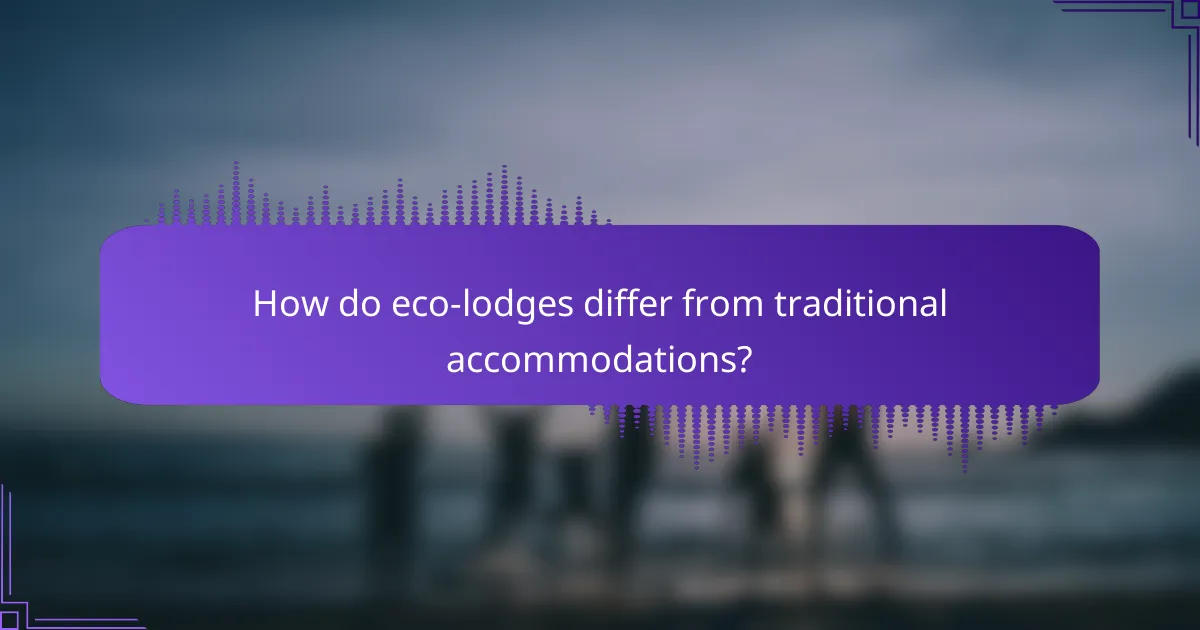
How do eco-lodges differ from traditional accommodations?
Eco-lodges prioritize sustainability and environmental conservation, unlike traditional accommodations. They often utilize renewable energy, promote local biodiversity, and encourage eco-friendly practices among guests. Eco-lodges in Costa Rica exemplify this with initiatives like waste reduction, organic farming, and wildlife preservation, enhancing the adventure experience while supporting the local ecosystem.
What unique amenities do eco-lodges offer?
Eco-lodges offer unique amenities such as organic meals, guided nature tours, and eco-friendly accommodations. These features enhance the experience of sustainability while promoting local biodiversity. Many eco-lodges also provide opportunities for adventure activities like zip-lining, hiking, and wildlife watching. Additionally, some lodges incorporate wellness programs, including yoga and meditation sessions, to foster relaxation and connection with nature.
How is the guest experience tailored to promote sustainability?
Eco-lodges in Costa Rica tailor the guest experience to promote sustainability through immersive practices. They utilize local materials, support community initiatives, and offer eco-friendly activities. Guests engage in wildlife tours, organic farming, and conservation projects, enhancing their connection to nature. These experiences foster awareness and appreciation for biodiversity while minimizing ecological footprints.
What are the benefits of staying at an eco-lodge versus a hotel?
Staying at an eco-lodge offers unique benefits compared to a hotel, including enhanced sustainability, deeper connection to nature, and immersive local experiences. Eco-lodges prioritize environmental conservation, reducing carbon footprints through sustainable practices. They often provide opportunities to engage with local biodiversity, such as guided nature tours and wildlife observation. Additionally, eco-lodges frequently support local communities, promoting cultural exchange and authentic experiences. In contrast, hotels may focus more on luxury and comfort, often at the expense of environmental impact.
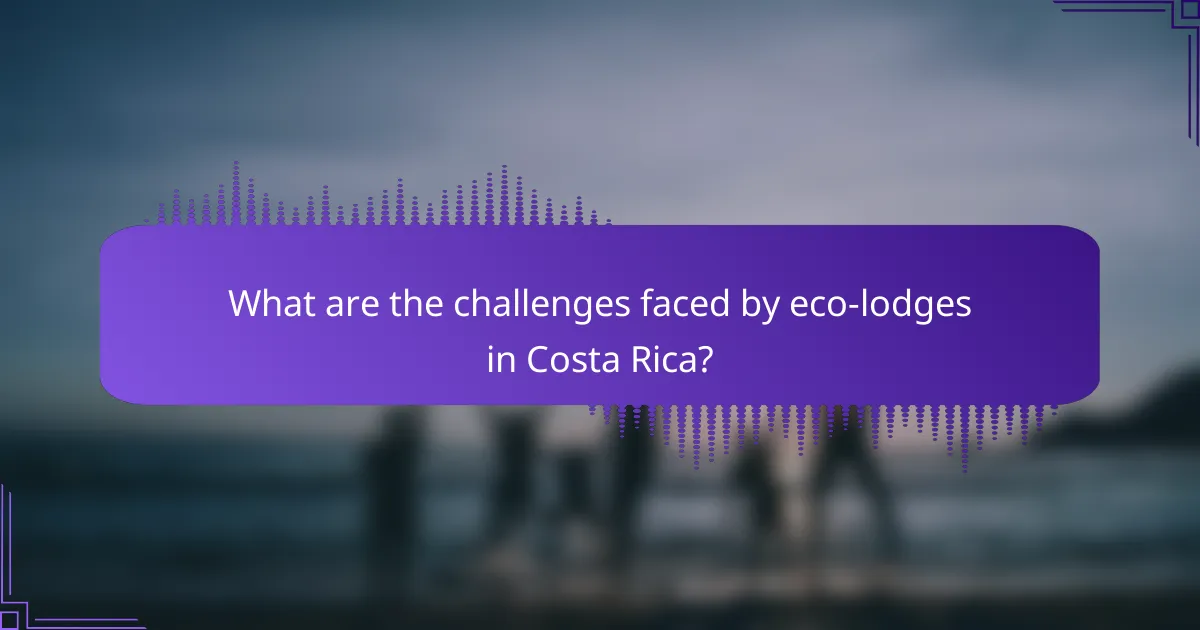
What are the challenges faced by eco-lodges in Costa Rica?
Eco-lodges in Costa Rica face several challenges, including environmental regulations, financial sustainability, and competition. Balancing eco-friendly practices with profitability remains a significant hurdle. Many lodges struggle with high operational costs associated with sustainable technologies and sourcing local materials. Additionally, attracting tourists in a competitive market can be difficult, especially with fluctuating travel trends. Lastly, maintaining biodiversity while catering to guests’ adventure needs often leads to conflicts in resource management.
How do economic factors impact their operations?
Economic factors significantly influence the operations of eco-lodges in Costa Rica. These factors include local economic conditions, tourism trends, and environmental regulations.
The demand for sustainable tourism often drives pricing strategies, impacting profitability. For instance, eco-lodges may charge premium rates due to their unique offerings and commitment to sustainability.
Additionally, fluctuations in currency exchange rates can affect the cost of imported goods, influencing operational expenses. Eco-lodges often rely on locally sourced materials, which can mitigate this impact while supporting local economies.
Lastly, government incentives for eco-friendly practices can enhance operational viability. These incentives encourage investment in sustainable technologies, aligning with the eco-lodges’ mission to promote biodiversity and conservation.
What environmental challenges do eco-lodges encounter?
Eco-lodges in Costa Rica face several environmental challenges, including deforestation, waste management, and climate change. Deforestation impacts local biodiversity and disrupts ecosystems. Waste management issues arise from increased visitor numbers, leading to pollution and resource strain. Climate change affects weather patterns, influencing tourism and local habitats. These challenges require eco-lodges to adopt innovative sustainability practices to mitigate their impact.
How do regulatory issues affect eco-lodge development?
Regulatory issues significantly impact eco-lodge development in Costa Rica by influencing operational practices and sustainability measures. Compliance with local environmental laws ensures that eco-lodges minimize their ecological footprint. For instance, regulations on land use and biodiversity conservation can dictate site selection and design, promoting harmony with nature. Additionally, permits related to waste management and resource usage shape sustainable practices, fostering eco-friendly tourism. These regulations help maintain Costa Rica’s rich biodiversity, ensuring eco-lodges contribute positively to the environment while offering adventure opportunities to visitors.

What are the best practices for choosing an eco-lodge?
To choose the best eco-lodge in Costa Rica, prioritize sustainability practices, biodiversity conservation, and adventure opportunities. Look for lodges that utilize renewable energy, support local wildlife, and offer eco-friendly activities.
Consider the following best practices:
1. Research the lodge’s sustainability certifications and practices.
2. Evaluate their impact on local biodiversity and conservation efforts.
3. Check guest reviews for authentic adventure experiences.
4. Ensure they provide local and organic food options.
5. Assess the lodge’s commitment to community engagement and support.
These factors will help you select an eco-lodge that aligns with your values and enhances your experience.
How can travelers identify truly sustainable eco-lodges?
Travelers can identify truly sustainable eco-lodges by evaluating their environmental practices, community involvement, and certifications. Look for lodges that utilize renewable energy, implement water conservation measures, and support local economies through hiring and sourcing. Certifications from recognized organizations, such as Rainforest Alliance or Green Globe, indicate adherence to sustainable practices. Additionally, consider the lodge’s commitment to biodiversity conservation and its impact on local wildlife. Engaging with reviews and testimonials can provide insights into the authenticity of their sustainability claims.
What questions should guests ask before booking?
Guests should ask about sustainability practices, biodiversity initiatives, and adventure opportunities before booking eco-lodges in Costa Rica. Understanding these aspects enhances the travel experience and aligns with eco-friendly values. Key questions include:
1. What specific sustainability practices do you implement?
2. How do you support local biodiversity?
3. What adventure activities are available on-site or nearby?
4. Can you provide information on your waste management and energy use?
5. How do you engage with the local community?
6. Are there opportunities for wildlife observation or guided tours?
What common mistakes should travelers avoid when selecting an eco-lodge?
Travelers should avoid common mistakes like overlooking sustainability certifications, ignoring location impact on biodiversity, and neglecting reviews on eco-lodge practices. Choosing eco-lodges that prioritize local culture and community engagement enhances the experience. Additionally, failing to consider adventure opportunities and environmental impact can diminish the eco-friendly goal. Always research and ask questions to ensure alignment with personal values.
